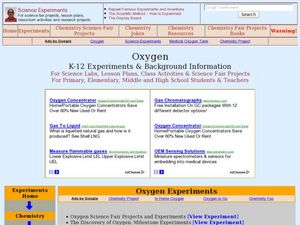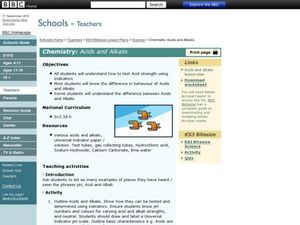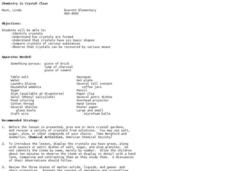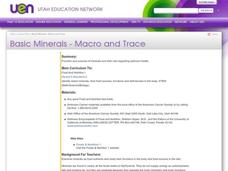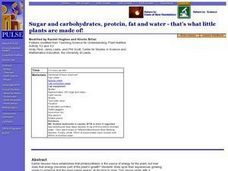Curated OER
Gas Law Investigation
Investigators collect the carbon dioxide produced when an antacid tablet is activated and identify what alteration produced the most gas. They also collect the gas in a buret in order to practice precision. Then they choose between two...
Concord Consortium
Acid Test
This isn't your typical basic lesson—it's more acidic! Learners use pH information to determine the hydroxide ion concentration of different substances and then use these values to analyze information. The calculations require...
Curated OER
A Very Simple Conductivity Meter
Students conduct a simple conductivity meter to test the ionic or non-ionic nature of water samples including one from their home.
Curated OER
Hydrolysis
In this hydrolysis worksheet, students write dissociation equations for the given salts and determine if the salt is acidic, basic, or neutral. This worksheet has 6 fill in the blank questions and 4 problems to solve.
Curated OER
Oxygen
Students explore oxygen and its physical and chemical propeties. In this investigative lesson students complete several experiments using oxygen.
Curated OER
From Polymers to Bioplastics: Looking Toward Finding Renewable Resources
Students investigate the properties of polymers. In this chemistry lesson, students explain the importance of energy sources. They produce a bioplastic from the lab and evaluate its structural integrity.
Curated OER
Soil Sample Lab
Young scholars test the pH of soil samples they collected from the field trip. In this chemistry lesson, students differentiate acids and bases. They write a lab report about the experiment.
Curated OER
To Smell or Not to Smell, That is the Ester
Students explain the basic concepts of polymerization. Students participate in a lab to create a crude preparation of carboxyl esterase and test its effectiveness in reducing the residual monomer in an emulsion such as paint.
Curated OER
Basic Vitamins: Water-Soluble and Fat-Soluble
Students examine vitamins and study their functions and food sources. They research what happens to vitamins when foods are overcooked. They prepare a microwaveable vegetable quiche.
Curated OER
Chemistry: Acids and Alkalis
Learners identify substances that are acids and alkalis. In this acids and alkalis lesson, students conduct tests to determine if given substances are acids or alkalis. They test substances and explain the different qualities that make...
Curated OER
Chemistry Worksheet-Phase Changes
In this phase change worksheet, students answer twenty questions about changes in energy to a system. They analyze phase diagrams, the determine the effects of changes in temperature on a system, they answer questions about miscibility,...
Curated OER
Chemistry is Crystal Clear
Learners observe crystals and their shapes and formation. In this crystal formation activity, the teacher prepares crystal gardens for the students to observe, then the class finds examples of crystals in nature and observe a teacher...
Curated OER
Basic Minerals - Macro and Trace
Identify minerals, their sources, functions, and deficiencies in the body. National Standard 14.2.1 Discuss macro minerals, electrolytes, and trace minerals Identify the problems associated with calcium and iron
Curated OER
Chemistry Wk 2
In this chemistry worksheet, students calculate the freezing point of a given solution. Students calculate the final temperature and state of the water in a given problem. Students solve several problems provided.
Curated OER
Activity #1 Reactions: Chemical or Physical?
Students distinguish between physical changes and chemical changes. They comprehend that chemical reactions produce new substances with compositions and properites which are different than those of the starting materials. Pupils also...
Curated OER
Making Soap
Students explore what chemical indicators are and use pH paper to determine if something is alkaline or basic. In this pH instructional activity students manufacture their own soap.
Pingry School
Kinetics of the Acid Decomposition of Thiosulfate
Several factors affect the rate of a chemical reaction including temperature, surface area, and concentration. Using an experimental approach, learners explore the effect concentration has on this rate while maintaining consistency with...
American Chemical Society
Liquids - Clearly Unique
Bring chemistry to life for scholars as they perform two tests to examine the unique properties of three liquids. Classroom investigators make observations, develop basic lab skills, and follow step-by-step instructions to compare water,...
Curated OER
Groups 1 & 2, the Alkali Metals and the Alkaline Earth Metals
Giving a clear review of the basic properties of the metals in groups one and two on the periodic table, this slide show would be useful for early learners of chemistry. Your class will learn about the trends down the groups, such as...
Curated OER
How Does Your (Coral) Garden Grow?
Analyze and graph oxygen isotope ratios in coral samples in relation to the distance from the outer skeleton edge. Compare the data to the mean monthly water temperatures. Uncover whether or not there is any correlation. In addition to...
Curated OER
More Thermochemistry Problems
This two-page assignment covers basic thermochemistry concepts. Chemistry learners identify exothermic and endothermic processes, explain a phase change graph, and draw an energy level diagram. There are no problems to solve, just...
Curated OER
Version 001 – Exam 1 – David Laude (53015) 1
A 30-question multiple choice chemistry test challenges takers. Topics touched upon include thermochemistry, equilibrium, behavior of gases, and pH. Problem solving is required in order to answer most of the questions. Other questions...
Curated OER
Sugar and carbohydrates, protein, fat and water - that's what little plants are made of!
Students identify photosynthesis as the mechanism by which plants convert sunlight energy into a usable energy source for plant processes. They identify photosynthesis as the mechanism by which plants create a molecule that can be used...
Curated OER
Ammonium Nitrate - Heat of Solution
Students quantify the relationship between temperature, energy and heat
and define an endothermic reaction. They measure the energy change caused by dissolving one mole of ammonium nitrate in water.






